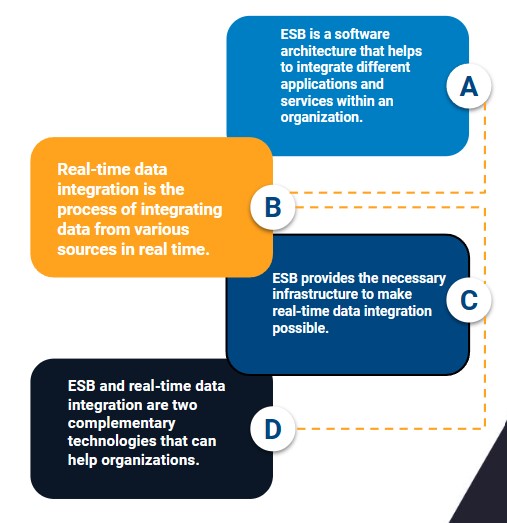How ESB is enabling real-time data integration for digital transformation
August 25, 2023
Table of contents
Quick Access
When talking about an Enterprise Bus Service, or ESB for its acronym in English, reference is made to an architecture that allows the integration of several applications into a single one through a platform that enables communication between them, being ideal for business projects where the work is divided into several departments with unique processes each.
On the Mulesoft page they offer an explanation for this technological solution “An Enterprise Service Bus (ESB) is fundamentally an architecture. It is a set of rules and principles for integrating numerous applications on a bus-like infrastructure. ESB products allow users to build this type of architecture, but they vary in the way they do it and the capabilities they offer. The central concept of the ESB architecture is that different applications are integrated by putting a communication bus between them and then each application is allowed to communicate with the bus."

ESB and real-time data integration
ESB (Enterprise Service Bus) is a software architecture that helps integrate different applications and services within an organization. It provides a central communication hub that connects disparate systems and enables seamless data exchange between them. Real-time data integration, on the other hand, is the process of integrating data from various sources in real time or near real time to provide accurate and up-to-date information.
ESB and real-time data integration are often used together to facilitate the exchange of real-time data between different applications and data sources. ESB allows communication between systems using a common set of protocols, which can be used to exchange data in real time. This ensures that the data is accurate and up to date and can be used for decision making in real time.

Real-time data integration can be used for a variety of applications, such as real-time financial reporting, real-time monitoring of network performance, real-time fraud detection, and more. ESB provides the necessary infrastructure to make real-time data integration possible by providing a platform for data exchange between systems.
ESB and real-time data integration are two complementary technologies that can help organizations achieve real-time data sharing between different applications and data sources, enabling better decision-making and providing accurate and up-to-date information. for a variety of applications.

The help of an ESB solution in digital transformation
“Independent coding can slow down the adaptation of digital technologies. An ESB integration solution can help organizations get the most out of their digital transformation initiatives. It helps solve many business problems and eliminate IT chaos” they point out in an article published on Steemit.
ESB solutions contribute to digital transformation in various ways, such as:
- Integration: ESB solutions provide a central platform for integrating different applications, systems, and data sources. This allows organizations to create a seamless IT environment, eliminating data silos and enabling better data management and decision making.
- Scalability: ESB solutions offer scalability, allowing organizations to add new systems, applications, and data sources as needed to support digital transformation initiatives.
- Agility: ESB solutions are designed to be agile, allowing organizations to quickly respond to changing business needs and take advantage of the opportunities presented by emerging digital technologies.
- Automation: ESB solutions provide automation capabilities, allowing organizations to automate processes and eliminate manual tasks, resulting in increased productivity and efficiency.
- Access to real-time data: ESB solutions facilitate the exchange of real-time data between systems, providing organizations with accurate and up-to-date information, which is crucial to making informed decisions and staying competitive in today's fast-paced digital economy.
In short, ESB solutions are contributing to digital transformation by providing the necessary infrastructure to integrate, scale, automate and ensure real-time data exchange between different applications and data sources, facilitating innovation and improving business processes and operations.
We recommend you on video
Related Blogs

What programming language is used for API development?

ERP Software: Benefits for the banking industry

Best Practices for Hiring an RPA Developer

BPM solutions for the hotel industry
